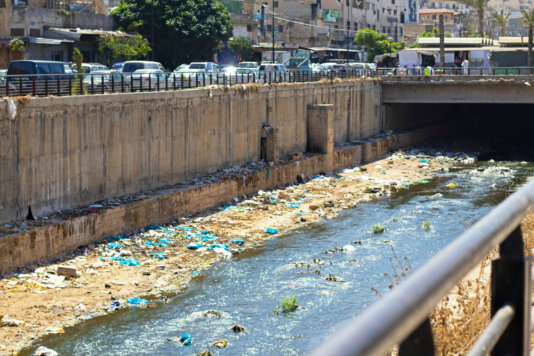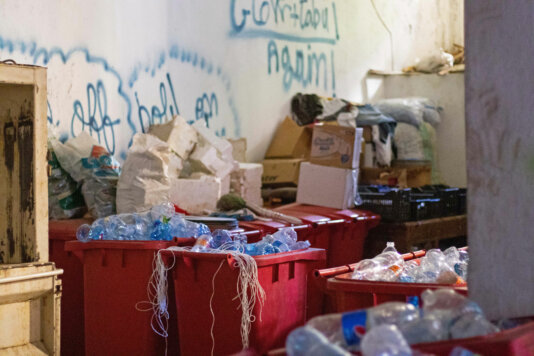- About
- Topics
- Picks
- Audio
- Story
- In-Depth
- Opinion
- News
- Donate
- Signup for our newsletterOur Editors' Best Picks.Send
Read, Debate: Engage.
| October 13, 2021 | |
|---|---|
| topic: | Sustainable Development |
| tags: | #Lebanon, #recycling, #Waste Management, #pollution |
| located: | Lebanon |
| by: | Katarzyna Rybarczyk |
This is demonstrated by the work of Green Track, a social enterprise promoting the sorting of trash at the source and facilitating waste collection and recycling in the north of Lebanon.
Green Track was founded four years ago in Tripoli, which is the second-largest and poorest city in Lebanon.
Plastic in Tripoli is abundant, as the city is facing a waste crisis and people do not know how to effectively manage their rubbish. Luckily, thanks to the work of Green Track, there is hope that Tripoli will see a cleaner, more sustainable future.
Tripoli has been struggling with managing its waste for years, and as the city, and Lebanon generally, lacks a comprehensive solid waste management strategy, waste is piling up on the streets of Tripoli.
Currently, Tripoli’s inhabitants dispose of their trash in public garbage bins, which are then emptied into a landfill in the north of the city. The landfill reached its maximum capacity a few years ago, but waste keeps being added to it.
Khoder Eid, the founder of Green Track explained that now waste spreads across twelve meters over the landfill’s intended limit. Consequently, trash and leachate coming out of it enter the Kadisha river and the sea, polluting the environment.
This is not a new issue, however. Lebanon’s waste crisis began in 2015, when a landfill in Beirut was closed after it reached its maximum capacity and the government failed to put an alternative waste collection strategy in place. In turn, tons of uncollected rubbish could be seen along the highway and in the city centre.
An additional problem with the standard strategy for managing waste in Tripoli is that the waste is not sorted. Garbage collectors get paid based on how much waste they collect, but they receive no economic incentive to sort the waste. That is a significant problem, as improper waste disposal can not only lead to water and air pollution but can also have a negative impact on the health of people living in the landfill’s vicinity.
Green Track was established four years ago when Khoder Eid managed to convince his family of the importance of ‘sorting at the source’. To help him get his project off the ground, his mother and her friends started a door-to-door awareness campaign during which they would walk around the neighbourhood and talk to people about the benefits of sorting their waste.
“As Green Track, we aim to address root causes of the garbage crisis and create a culture of recycling,” Eid told FairPlanet.
Households that join Green Track’s mission receive recycling bags and special bins needed to sort their waste. Green Track then collects them every Monday and Thursday and takes the rubbish to the warehouse where the waste is sorted and compressed.
Later, Green Track sells the recycled material to factories that use it in their production processes. Recently, Green Track also received a shredder from COSV, an Italian NGO that supports humanitarian projects and social enterprises in Europe, Africa, and the Middle East.
“Unfortunately, we didn’t have the capital to acquire it ourselves,” said a Green Track volunteer named Jorne. He added that the organisation “strives to sell shredded plastic and generate revenue by the end of the year.”
Thanks to the new machine, the shredded plastic can be sold at a higher price, further increasing Green Track’s ability to raise awareness and reduce the environmental degradation of North Lebanon.
While Green Track’s primary mission is to promote sorting at the source and help people manage their waste better, the organisation also has a wider social impact objective. Firstly, it employs women, marginalised men and youths. For women, working for Green Track empowers them and reduces their dependence on men. For unemployed men, it is a chance to earn an income and change their position in society. As for the youth, Green Track equips them with professional skills that will help them find good employment in the future.
By working in former conflict zones in Tripoli, Green Track hopes to release tensions between communities living in the Bab al-Tabbaneh and Jabal Mohsen neighbourhoods and encourage them to work together.
To show people that their participation in the organisation’s mission matters and in order to support them, Green Track gives something back. Families receive, for example, washing liquid and leaflets explaining how to correctly sort their waste.
“As Green Track grows, in the future maybe we will be able to give families rice or other incentives,” said Jorne.
Over the last four years, Green Track has grown significantly. It now employs around 19 people and works with around 200 households. Altogether, it collected around 100 tons of waste. The impact Green Track has had on communities living in Tripoli is significant, but each day the organisation is dealing with numerous challenges that slow down progress.
Due to the current electricity crisis in Lebanon, machines used to compress and shred plastic bottles are only operational for around one hour a day. Furthermore, the fuel crisis has made collecting waste from households difficult, and Green Track has to resort to bicycles.
Additionally, many Lebanese either do not think there is any harm in throwing away plastic bottles and other waste on the ground or they do not see the point in sorting trash at the source. Changing people’s mentality and raising awareness about the benefits of a more sustainable approach to managing waste is proving to be a challenging task.
On top of that, there is the issue of raising funds for Green Track’s operations. The organisation runs on the profit it generates from selling processed waste and grants offered by the European Union. Money is needed to buy machines and enhance infrastructure for the treatment of collected waste. In the absence of financial help from the government, securing more funding from the EU is needed.
Khoder mentioned that ‘Raising awareness, giving people the right tools, and organising the collection process, it all goes together but the right infrastructure is needed and for that Green Track needs to have adequate funding.’ Still, filing and submitting applications for available grants can be a complex process.
The work of Green Track demonstrates that proper recycling can save Tripoli from drowning in waste and serve as a driver of positive social change, as it encourages the residents of Tripoli to adopt more sustainable practices while opening new opportunities to marginalised demographics. With sufficient support and recognition, Green Track’s model could affect change well beyond Tripoli.
Image by: Katarzyna Rybarczyk
By copying the embed code below, you agree to adhere to our republishing guidelines.


